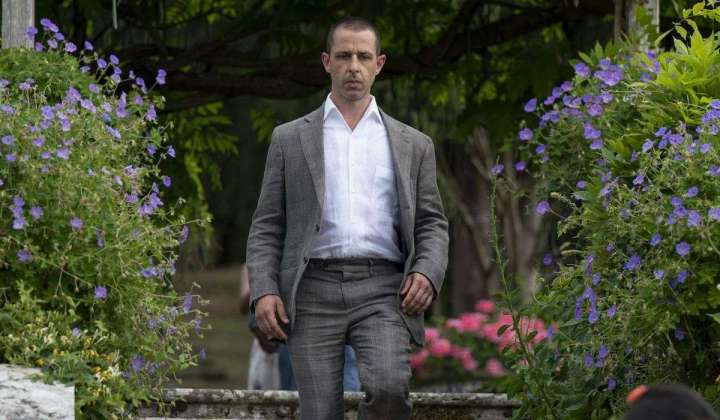‘Succession’: How Kendall Roy can save TV network, America with honor

OPINION:
In the Oliver Stone classic film “Wall Street,” the young stockbroker Bud Fox relies on the wisdom of Gordon Gekko, a brilliant but amoral hedge fund manager, to guide his career. Amid a crisis of conscience, Bud is taken aside by his straight-laced supervisor, Lou Mannheim, who tells him:
“Man looks in the abyss, there’s nothing staring back at him. At that moment, man finds his character. And that is what keeps him out of the abyss.”
“Succession” is hailed by some critics as the best television series of all time. Based on Rupert Murdoch’s News Corp. conservative media empire, the show focuses on the owners of Waystar RoyCo, a global media and entertainment conglomerate. It illuminates the power struggles patriarch Logan Roy imposes upon his three children: the firstborn Kendall, the unpredictable Roman, and their Machiavellian sister, Siobhan (Shiv) — all competing to become CEO.
While viewers have spent four seasons speculating who will succeed their father, I believe the show is about Ken, who was supposed to take the reins early on, only to have them withdrawn by his father, who decided he was not ruthless enough.
While the show revolves around the siblings’ witty insults and clever dueling, the real story is Ken’s inner conflict.
Kendall Roy is a fundamentally decent person plagued by the belief he needs to become indecent to rise to his father’s expectations. He has more of a conscience than his siblings, often making him hesitate, a trait he and others mistake for weakness.
When faced with a difficult decision, all three siblings repeatedly turn to the trope “What would Dad do?”
Such is the case even when Kendall goes rogue and uses company records to embroil his father in a scandal.
The question has even more meaning in the final season after Logan dies, and the siblings face a new adversary, Lukas Mattson, the billionaire CEO of GoJo, a Norwegian tech company acquiring their empire.
While Kendall and Roman struggle to outmaneuver Mattson, Shiv undermines her brothers behind the scenes by helping Mattson achieve control, hoping he will appoint her CEO. This betrayal comes to light at a critical juncture on election night when their ATN television network is faced with a decision to prematurely call the election between far-right Republican Jeryd Mencken, backed by Roman, and moderate Democrat Daniel Jimenez, backed by Shiv.
When several thousand ballots are suspiciously set aflame in Wisconsin on election night, giving Mencken a slight edge in a state he was expected to lose, Roman wants to call it for the Republican — not for moral reasons, but strategic ones. Mencken has promised to block the GoJo deal, effectively placing he and Kendall in control.
While Shiv tries to convince her brothers that calling the state is premature and could hurt ATN and America, Kendall is rightly suspicious of her. After he and Roman resolve the question of “what would Dad do” with the answer: “whatever the f—- he wanted,” Ken goes against his moral instincts to call Wisconsin for Mencken solidifying his position at ATN. Shortly thereafter, when Mencken wins Arizona, the network is forced to call the election because the Republican has more than 270 electoral votes.
After Mencken declares victory, he offers separate assurances to both Shiv and Kendall at their father’s funeral, leaving ATN’s fate uncertain.
While Mencken is portrayed publicly as a hard-right candidate, he is a closet extremist, a fact Roman learns when the two are alone, forcing Kendall into a moral crisis: He can either do what he thinks his father would do — “whatever the f—- he wants” — or he can follow his conscience and do what he believes is right.
To achieve this, Kendall must do the unthinkable and recall the election until the premature Wisconsin ballot issue is resolved — a move that would risk his reputation, and potentially compromise his future at the company. But it would save ATN from losing credibility — and more importantly, save America from what “Wall Street” called “the abyss.”
While many have viewed “Succession” as a story about what a young person must do to step into the shoes of their godlike ancestors, I believe the opposite is true, as it is a story about the path one takes to step out of their shadows into their own light. As Voltaire once said, “whoever serves his country well has no need for ancestors.”
This leaves us in suspense wondering if Kendall will finally demonstrate the moral courage he needs to save his family’s network and the country he loves. We will find out Sunday night.
As for me, I believe in the moral conscience of the individual, and I believe Kendall Roy will find his destiny — if he trusts himself and does the right thing.
• Jeffrey Scott Shapiro is a former Washington prosecutor and investigative journalist. He is a former senior U.S. official who currently serves as a member of The Washington Times’ editorial board. He can be reached at jshapiro@washingtontimes.com.






